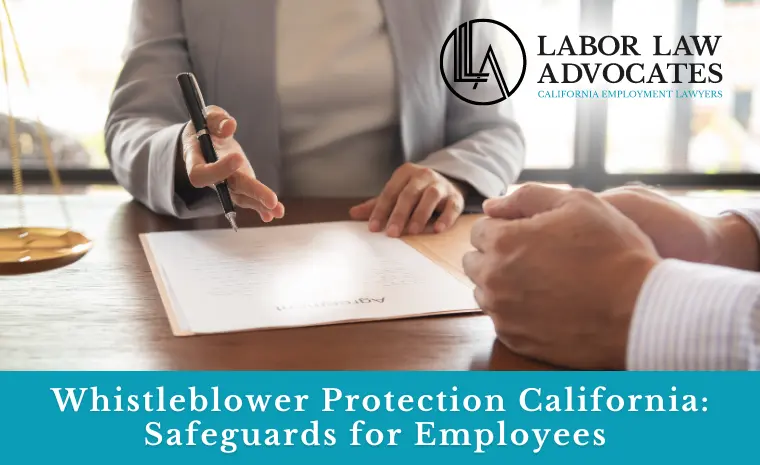Whistleblower Protection California: Safeguards for Employees
Whistleblower protection in California refers to the legal measures to safeguard individuals who report illegal, unethical, or fraudulent organizational or governmental activities. Whistleblowers play a critical role in uncovering wrongdoing, exposing corruption, and promoting transparency. Without adequate protection, employees may fear retaliation, which can hinder their willingness to report such misconduct.
The California Whistleblower Protection Act
The California Whistleblower Protection Act (CWPA) is a federal statute that safeguards employees who disclose improper activities. Under this act, employees are protected from retaliation against employers when they report violations of state or federal laws. The CWPA provides legal remedies for those who experience adverse employment actions for their disclosures.
Whistleblower Protection California Against Retaliation
California law prohibits employers from retaliating against employees who engage in protected whistleblowing activities. Employer retaliation can include termination, demotion, harassment, or any other adverse action taken against the employee in response to their report. If an employer is found guilty of retaliation, they may face civil penalties and legal consequences.
Confidentiality and Anonymity
To ensure the safety and protection of whistleblowers, the CWPA allows for anonymous reporting. They have the option to remain confidential while reporting misconduct. This provision encourages individuals to come forward without fear of reprisal or intimidation.
Experienced employer retaliation after reporting an illegal activity in your workplace?
Whistleblower Eligibility and Rights
There are several California labor laws that support the CWPA. These include:
- California Labor Code Section 1102.5: Also known as the California Whistleblower Law, it states that if an employer engages in unlawful activities against the whistleblower, the employer might be obligated to restore the employee’s employment status and benefits, provide compensation for lost wages, and undertake any additional actions as mandated by the law.
- California Labor Code Section 1278.5: This healthcare whistleblower statute protects nurses, medical staff, patients, and other health care workers if they report unsafe patient care incidents to specific government and law enforcement agencies.
- California Labor Code Section 12940: Also known as the California Fair Employment and Housing Act (FEHA), this law prohibits retaliation from employers from employees making a complaint or because of their race, medical condition, sex, age, sexual orientation, color, religion, or national origin.
Whistleblower protection California laws cover a wide range of disclosures, including but not limited to:
- Financial misconduct: Those who report fraudulent accounting practices, insider trading, embezzlement, or other financial irregularities.
- Workplace harassment or discrimination: Individuals who expose instances of harassment, termination, discrimination within the workplace.
- Health and safety violations: Those who disclose unsafe working conditions, violations of health and safety regulations, or failure to comply with environmental standards.
- Government fraud and corruption: Those who report fraud, bribery, corruption, or misuse of public funds by government entities.
- Violations of law and regulations: Those who bring attention to violations of law, regulations, or ethical codes in various industries and governmental agencies, such as public health care, banking, or environmental protection.

Rights and Protection of a Whistleblower
Whistleblower protection laws provide important rights and protections to individuals who come forward to report misconduct.
- Protection from retaliation against private and government employees
- Confidentiality and anonymity
- Legal remedies
- Non-disclosure agreements (NDAs)
- Financial rewards
Reporting Process
Whistleblowers play a critical role in uncovering wrongdoing within organizations, but the process of reporting misconduct can be daunting. To ensure a safe and effective reporting environment, whistleblower protection California emphasizes the importance of maintaining confidentiality and provides various channels for reporting, including anonymous options.
Here are some steps to consider when reporting:
Gather Evidence
Before making a report, gather any relevant evidence that supports your claims of fraudulent activity. This may include documents, emails, photographs, or any other convincing evidence that can substantiate your disclosure.
Understand Internal Reporting Mechanisms
Familiarize yourself with your organization’s policies and procedures regarding whistleblowing. Many companies have established internal reporting mechanisms such as hotlines, designated contact persons, or specific departments to handle such reports.
Follow Reporting Protocols
Adhere to the reporting protocols set by your organization. This may involve submitting a written report, completing a specific form, or using designated reporting channels. Ensure that you provide accurate and detailed information regarding the misconduct you are reporting.
Document your Report
Keep a record of your report, including the date, time, and method of submission. If possible, retain copies of any correspondence or acknowledgments received from your organization regarding your disclosure.
Seek Legal Advice
If you have concerns about retaliation or the internal reporting process, consider seeking legal advice from an experienced law firm specializing in whistleblower protection laws. An employment attorney can provide guidance on your rights and help you navigate the reporting process effectively. They can also help you file claims.
Maintaining Confidentiality
Confidentiality is a critical aspect of whistleblower protection, especially for individuals who have fear of retribution from their employers. They might fear reprisal or retaliation for their disclosures, making it crucial to safeguard their identities.
Here are some key points regarding confidentiality:
- Legal protections: Whistleblower protection laws often include provisions that protect the confidentiality. These laws prohibit employers from disclosing the identity of whistleblowers or retaliating against them for making reports.
- Need-to-know basis: Organizations should ensure that only individuals with a legitimate need-to-know are informed about the whistleblower’s identity or the details of the disclosure. Maintaining strict confidentiality minimizes the risk of reprisal and helps protect the employee’s rights.
- Restricted access: Access to information related to the whistleblower’s identity or the details of the report should be limited to individuals involved in the investigation or those responsible for addressing the issue. Implementing secure systems and protocols can help prevent unauthorized access.
Anonymous Reporting Options
To further protect whistleblowers, many jurisdictions and organizations offer anonymous reporting options. Here are some common methods of anonymous reporting:
- Hotlines: Anonymous hotlines allow whistleblowers to report misconduct without revealing their identity. These hotlines are typically managed by a third-party service provider, ensuring confidentiality and anonymity.
- Online reporting portals: Some organizations provide online reporting portals that allow whistleblowers to submit reports anonymously. These portals are designed to protect the whistleblower’s identity and provide a secure means of reporting.
- Anonymous email or mail: Whistleblowers can choose to send anonymous emails or letters to designated addresses within the organization or regulatory authorities. These methods help protect the whistleblower’s identity while still allowing them to disclose the necessary information.
Anonymous reporting may have limitations, particularly in cases where additional information or clarification is required to address the reported misconduct. Whistleblowers should assess the risks and benefits of anonymous reporting based on their specific circumstances.
Remedies for Whistleblower Retaliation
Whistleblower retaliation occurs when an individual who has disclosed wrongdoing within an organization faces adverse actions or mistreatment as a result of their activities.
Those who experience retaliation have legal recourse to address the harm they have suffered. Here are some common legal options:
- Filing a retaliation complaint with regulatory agencies: Whistleblowers can file a complaint with relevant regulatory agencies responsible for enforcing protection laws. These agencies can conduct investigations and take appropriate actions against employers found to have retaliated against whistleblowers.
- Initiating a lawsuit: Whistleblowers may choose to file a lawsuit against their employer for retaliation. They can seek legal remedies and damages for the harm they have endured.
- Whistleblower protection statutes: Many jurisdictions have specific protection statutes that outline the rights and protections available. These may include provisions for legal actions and remedies in cases of retaliation.
Compensatory Damages
Whistleblowers who successfully prove retaliation in a legal proceeding may be entitled to various compensatory damages. The specific remedies and damages available may vary depending on the applicable labor laws in California. Here are some common remedies and damages sought by whistleblowers:
- Reinstatement: Whistleblowers who have been wrongfully terminated or subjected to adverse employment actions may seek reinstatement to their former position or a comparable position within the organization.
- Back Pay: Whistleblowers may be entitled to receive back pay, which includes the wages, salary, and benefits they would have earned if not for the retaliation. This can include compensation for lost income during the period of retaliation.
- Front Pay: In cases where reinstatement is not feasible or desirable, whistleblowers may be awarded front pay. Front pay represents the compensation the whistleblower would have received if they had continued to be employed by the organization.
- Compensatory Damages: Whistleblowers may seek compensatory damages to compensate for the emotional distress, mental anguish, and reputational harm they have experienced due to retaliation. These damages are intended to make the whistleblower whole for the harm suffered.
- Punitive Damages: In some cases, whistleblowers may be awarded punitive damages. These damages go beyond compensating and serve as a punishment for the employer’s retaliatory actions. Punitive damages are typically awarded when the employer’s conduct is found to be particularly egregious or malicious.
- Attorney Fees: Those who prevail in their retaliation claims may be awarded attorney fees and costs associated with pursuing their legal case. This provision helps alleviate the financial burden faced by whistleblowers in seeking justice.
Get Help From an Award-Winning Employment Attorney
If you experienced retaliation after reporting illegal conduct or activities or need help in filing whistleblower claims, getting in touch with an experienced employment attorney for advice can be beneficial in many ways. A skilled lawyer can provide legal guidance and advice on your rights, help you document the retaliation, and assess the strength of your case.
Labor Law Advocates has award-winning employment law attorneys. We can help you fight for your rights against employer retaliation after whistleblowing activities and represent you in civil actions if necessary. Increase your chances of a successful outcome and obtain the compensation and justice you deserve.
Call us today at (424) 688 3632 for a FREE, no-obligation consultation.




